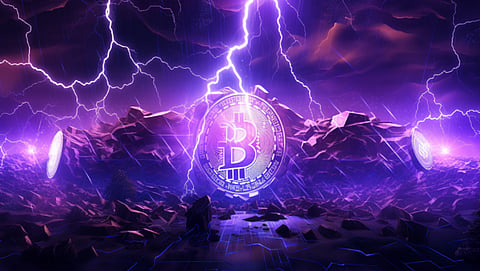

Bitcoin Spark (BTCS) has undeniably gained significant recognition in the crypto community. Industry watchers suggest it has significant potential for growth as its strategy is informed by Bitcoin (BTC), Tezos (XTZ), and Bitconnect (BCC) outcomes.
Bitcoin is the first and widely-known cryptocurrency, created by an anonymous person or group using the pseudonym Satoshi Nakamoto in 2009. It introduced decentralized blockchain technology, a distributed ledger that records all transactions across a network of computers. The primary function of Bitcoin (BTC) is to enable peer-to-peer transactions without the need for intermediaries like banks. It is also referred to as digital gold due to its limited supply cap of 21 million. Bitcoin has gained widespread adoption and recognition as a hedge against inflation and investment, with its price experiencing a significant uptick from its nascent days.
Tezos is a blockchain platform designed for smart contracts and decentralized applications. The Tezos network achieves consensus using a Proof-of-Stake (PoS) consensus mechanism, which is meant to be more energy-efficient than Proof-of-Work (PoW) systems like Bitcoin. Additionally, Tezos uses a unique governance model that allows those who own its XTZ token to vote on any changes on the network. Once the consensus is achieved, the software automatically updates the rules across all network nodes.
Bitconnect, while once a notable name in the cryptocurrency space, is now infamous for its 'high-profile Ponzi scheme.' Bitconnect operated as a lending platform, allowing users to lend the value of Bitconnect (BCC) tokens in return for interest payments. Users would invest in Bitcoin, receive BCC in return, and then lock in the instantaneous value of the coin for a set period of time while earning interest. However, Bitconnect's business model was unsustainable as it relied on recruiting new investors to pay returns to earlier participants. When the scheme collapsed in early 2018, it resulted in significant financial losses for many participants, regulatory investigations, and a tarnished reputation for the cryptocurrency industry as a whole. Bitconnect serves as a cautionary tale of the risks associated with unsustainable cryptocurrency projects.
Bitcoin Spark is a new blockchain project that seeks to solve the limitations of its predecessors and introduce a new generation of cryptocurrency.
Bitcoin Spark shares the foundational principle of a maximum supply of 21 million coins with Bitcoin, aligning with the idea of scarcity and value preservation. However, it goes beyond this by enabling BTCS to provide access to smart contracts and decentralized applications (Dapps) like XET in Tezos. Bitcoin Spark is set to have a smart contract layer with multiple execution systems that all reach finality on the main network, which allows for multiple programming languages, ensuring scalability while promoting diversity.
Bitcoin Spark's strategy also takes into account Tezos' community-driven approach. It prioritizes sustainability, transparency, and security. The network uses a proprietary consensus mechanism, the Proof-of-Process (PoP), which nonlinearly rewards users for confirming transactions and contributing their processing power. The network will have vast nodes, which, combined with the nonlinearity of rewards, allows for a large number of validators, promoting true decentralization. The Bitcoin Spark team is set to provide an application that will enable anyone with a smart device to participate in network validation.
Notably, the processing power contributed by validators will be rented out to organizations and individuals seeking remote computing power in exchange for BTCS. 97% of the revenue generated will be distributed among validators in addition to newly minted BTCS and transaction fees, and the remaining 3% will be allocated to network development. Additionally, the Bitcoin Spark application and website will have small spaces for community-policied ads, which will also be paid for in BTCS. Network participants will receive 50% of the revenue earned plus additional incentives for policing the ads. By monetizing idle processing power and generating revenue through the booming marketing industry, Bitcoin Spark establishes a robust and sustainable financial model, mitigating the pitfalls that led to Bitconnect's downfall. The Bitcoin Spark team has also conducted multiple smart contract audits to ensure the sustainability of its systems.
Bitcoin Spark is currently in Phase 6 out of 10 in its Initial Coin Offering (ICO), selling BTCS at $2.75 and offering an 8% bonus, among other benefits.
Website: https://bitcoinspark.org/
Join our WhatsApp Channel to get the latest news, exclusives and videos on WhatsApp
_____________
Disclaimer: Analytics Insight does not provide financial advice or guidance. Also note that the cryptocurrencies mentioned/listed on the website could potentially be scams, i.e. designed to induce you to invest financial resources that may be lost forever and not be recoverable once investments are made. You are responsible for conducting your own research (DYOR) before making any investments. Read more here.
